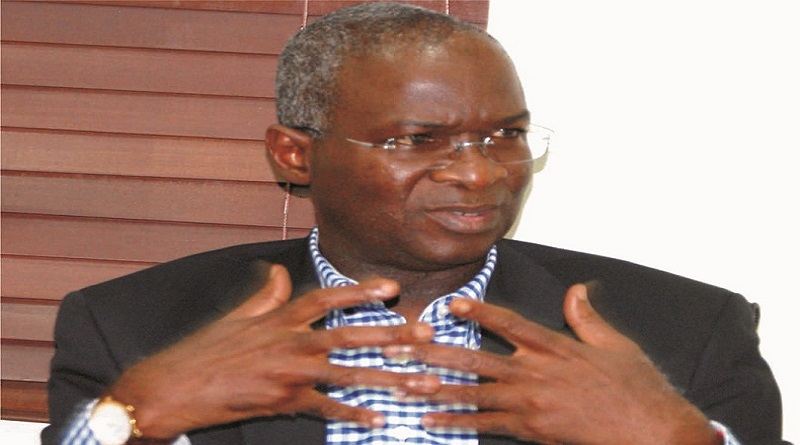Minister lists steps to achieve incremental power supply
Minister of Power, Works and Housing, Mr. Babatunde Fashola on Thursday in Kaduna during the Second Edition of the National Council on Power highlighted the practical steps for achieving Incremental Power in the short term saying the immediate goal was increasing power from all available sources in the country.
In his Keynote address at the Executive Session of the Second Edition of the National Council on Power in Kaduna which took place at the Umaru Musa Yar’Adua Hall, Murtala Muhammed Square, Kaduna, Fashola said the first requirement was to get power from every available source, whether wind, solar, coal or hydro adding that this would be the only means to address the current shortfall of power supply in the short term in order to make it available to more consumers across the country.
Fashola, who stressed the importance of incremental power, listed some of the sources through which incremental power would come to include the 215MW power plant in Kaduna, which he stated would begin running its first two turbines in early 2017 to generate between 25 and 30 MW of electricity.
Also, the Minister expects power to come from the 700MW power plant in Zungeru, Niger State whose completion, he said, would come “hopefully in the near termâ€. Others include the almost complete 10MW wind energy plant in Katsina State, the 39MW plant in Dadin Kowa, Gombe State, the 450MW power plant at Azura in Edo, Gurara Power Plant (Phase 1), which is expected to inject about 30MW into Kaduna and its environs later in the year and eventually the Mambilla Power plant, which, according to the Minister, “will be the largest single power Plant in the country sitting in one place, of about 3,000MWâ€.
“So this is part of our road to Incremental Powerâ€, he said.
Noting however, that generating power alone would not take the country to Incremental Power, Fashola declared that “Transporting power will be a critical componentâ€, adding that it would require the completion of some on going transmission projects.
According to the Minister, these include projects in Kano, Kaduna, Cross River, Edo, Katsina, Bauchi, Bayelsa, Rivers, Imo and Plateau States. He also added that at this moment “work is ongoing with quite a number of themâ€, where according to him, “work had previously stopped for two or three years because contractors were not being paidâ€.
“But the Budget for this year, which has been quite a challenge in delivery for the commitment of the President in delivering a budget that works, has led to restoration of confidence in contractors who are now going around mobilizing back to sites. And as we go on we will begin to see one after the other, kilometre by kilometre some of these transmission projects coming on streamâ€, he said.
Describing the theme of the conference, “Achieving Incremental, then Stable and then Uninterrupted Power†as important, Fashola said that it captured the roadmap developed by the Ministry for improving power supply in the country, as he pointed out that the first stage was simply recognizing that there was not enough power “so we must increase our power production until achieving that goal becomes harmonizedâ€.
The second reason, he said, was that it would be impossible to achieve the roadmap without the support and collaboration of the states adding that a meeting such as the Second Annual Council on Power “where state representatives are here†provides a useful platform beyond letters for all stakeholders to harmonize around the immediate short term goal of Incremental Power, adding that “everything that everybody can do in their sphere of influence towards achieving incremental power in the short term will be most helpfulâ€.
He recalled that the Kaduna State Governor, Mallam Nasir El-Rufai had on Wednesday reiterated his state government’s commitment, by way of funding, if needed, for the completion of the 215MW Kudenda Power Project in Kaduna State. He added “that it is a good step in the pursuit of Incremental Powerâ€.
The Minister also said the money may, eventually not be needed as the National Assembly had “commendably†provided appropriation in this year’s Budget for that purpose.
Calling for the support and cooperation of all states in the country for the achievement of Incremental Power, Fashola commended the Kaduna State Governor for his exemplary conduct in demonstrating support and cooperation by the way he intervened in settling all issues that previously impeded commencement of work on the Kaduna Power Plant.
According to the Minister, “Within weeks of his intervention, the parties decided to come out of court; compensation issues remain rife but work has resumed after an almost three year delay of that power plantâ€, adding that his Ministry was trying to get the state government (Akwa Ibom) to intervene again and assist it in Itu Local Government where two local communities had stopped the completion of the last six kilometres of a transmission line there.
He said the contractor handling the project had to withdraw in fear, arising from disputes between the two communities over the relocation of shrines. He added that the contractor was afraid that some spiritual invocations made in the place could affect him and so left the site in fear.
The Minister also expressed dismay over the development, as he wondered whether shrines generate electricity or have powers. He however added that “somehow the contractors seem to believe thatâ€, pointing out regrettably that “we are just six kilometres away from completing a major transmission siteâ€.
Citing the development as one of the areas where state and local governments should assist and give support, Fashola urged the government of the state and the local government chairman to intervene and “speak to the shrines to leave the way so that we can lay our cablesâ€.
The Minister who also cited his experience in Zamfara State recently to buttress his point relating to capacity expansion as a result of direct government intervention, said he was in the State at the government’s invitation, to commission some rural intervention power projects, which according to him, “could only have happened at this time because the state government decided to extend power to communities that had not been connected to electricity for decadesâ€.
“This is what is possible if we work and play in this industry with state governmentsâ€, Fashola said pointing out that at this time when states were challenged for revenue, the expansion of the electricity industry obviously provided a veritable means of revenue that could and would come to the states.
He noted that Value Added Taxes from operators in the business would ultimately accrue to the states that generated them adding that “it is really no longer the case that not all states have the capacity to generate internal revenue even by way of Value Added Tax, because somewhere along the line as we go on, people are buying and selling power and will do more. People are producing power equipment and things like that and the states that do more will ultimately earn moreâ€.
Fashola however said that in order to be clear about where the nation was going and how to get there, there was need to do two important things including enumerating the power needs of the people and knowing the population of the country, an exercise which he hoped could be achieved during the coming census.
“Just as the representative of GIZ was delivering her goodwill message, I made a comment to Governor El-Rufai when she said we are now estimated at 180 million and I said to him have we reached 180 million? And the Governor said we may just add seven million every yearâ€, the Minister said.
Stressing the importance of reliable data, Fashola declared, “We cannot plan without data. We need a reliable data base of how many we areâ€, recalling that earlier in the day there were various figures on television of the nation’s housing deficit saying while one report was quoting 10 million, another was quoting 17 million.
The Minister said the importance of data in the distribution of power could not be overemphasized because power had to be delivered to homes and this could not be done effectively if there was no reliable data of how many homes need to be serviced and provided with power.
The Minister went further to say that “We must begin to think seriously about this because this is the instrument that will liberate this countryâ€, adding that it would be the most effective tool needed by the power sector in order to carry out its functions effectively and to the satisfaction of all. Continuing, he charted how within the last ten years the national demand for power had grown because of the expansion of telecommunications adding that millions of people now make use of telephones, laptops, i-phones, electronic banking. “With all of that being driven by power, who is taking audit?†He asked. He also added that unless accurate data was produced to show the actual power need, power may increase but it won’t be sufficient.
Emphasizing the importance of accurate census, Fashola declared, “I must say, when that opportunity comes, the State and Local governments must be our champions crusading and canvasing that people should stay where they really live and do business not going back to their towns and villagesâ€.
About achieving uninterrupted power, Fashola, who said it was the last leg of the journey, added that it was based on conservation, adding, “We just have to conserve because what is wasted will never be enough. And so if anyone of us is here who left a tap running before you left home, you are just adding to our energy demand needlessly. Everybody must acquire a conservation cultureâ€.
He thanked the officials of the Ministry, particularly the Minister of State for Power, Hon. Mustapha Baba Shehuri, who he says has been a major pillar of support in the Ministry, the Permanent Secretaries for their leadership and the directors as well as all other management staff in the Ministry, especially those in the Power arm.
Commenting on some “misleading comments†by some obviously misinformed people about the Energy Mix policy, Fashola, who cited example of such policies in other countries, recalled that the nation was at 80 percent gas in February this year and has lost that gas due to vandalism, causing a drop in electricity supply from 5,000MW to about 2,000MW. He added that with the current development, the nation’s energy mix was 50 per cent gas and 50 per cent hydro.
“So the first lesson to take away is that the energy mix is not a permanent document. It is a dynamic documentâ€, the Minister said adding that if gas was restored eventually, the nation would go back to the coefficient of 80 per cent gas. He said as progress is made there would be changes although the target remained the same.
In his remarks, the State Governor, Mallam Nasir el-Rufai thanked the Minister and his team for agreeing to hold the Power Council in Kaduna saying there is a need to continue to ventilate the issues in the Power Sector because the sector was the fulcrum around which the activities of nations revolve.
Describing Fashola as a hardworking Minister, who, according to him, salvaged Lagos as Governor when all hopes were lost on the former concrete jungle, El-Rufai declared , “Many of us are looking up to you to again do the impossible which is to supply enough electricity for the nation. Expectations are high and resources are non-existent. But the people want uninterrupted and cheap electricity because that is what you did in Lagosâ€.
“So, Your Excellency I don’t envy you, I pray for you all the time, you and your team. But it is clear that the roadmap, the agenda that you outlined today is getting us to the Promised Land. We support you, we pray for you and whatever we can do as the government of Kaduna State, I want to assure Minister Fashola and his team that we will do itâ€, he said.
Also present at the Council meeting were the Minister of State in the Ministry, Hon. Mustapha Baba Shehuri, Permanent Secretary, Power, Mr. Louis Edozien, members of the National Assembly with oversight functions on the sector, top officials of the Ministry of Power, Works and Housing, representatives of the various states of the Federation, SE4ALL(Africa Coordinator) ,Dr. Daniel-Alexander Schroch, CEO of the Nigerian Economic Summit Group(NESG), Mr Laoye Jaiyeola, Head of Programme for the German Development Cooperation(GIZ) in Nigeria, Ms. Ina Hommers, representative of the West African Power Pool ,Mr Moustapha Cisse and other development partners, as well as members of the Organized Private Sector and stakeholders in the Power Sector.




